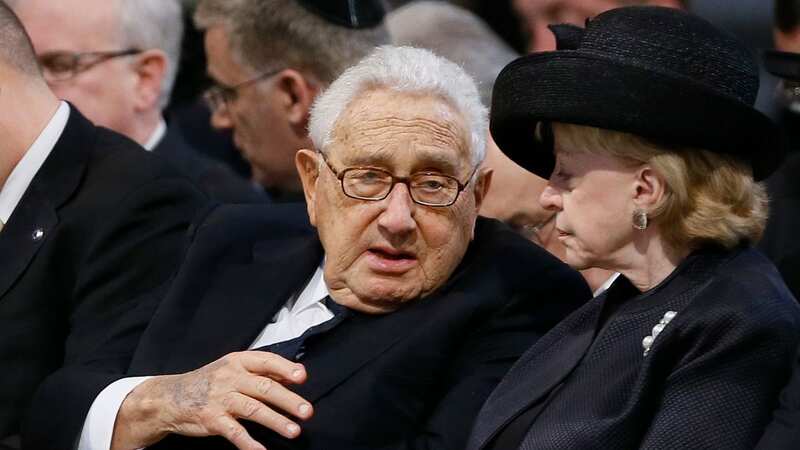Tony Blair leads UK tributes to Henry Kissinger, who has died aged 100

British political leaders paid tribute to American statesman Henry Kissinger today after his death aged 100.
The widely-admired envoy died after a decades-long career of diplomacy, having served as Secretary of State under presidents Gerald Ford and Richard Nixon.
Prime Minister Rishi Sunak’s spokesman said: “The PM met Henry Kissinger in London around his birthday just last summer. His thoughts are with Henry Kissinger’s family and loved ones today. Mr Kissinger had perhaps the most profound impact on American foreign policy in recent years. He leaves behind a lasting legacy, and his experience and insight will be greatly missed.”
Former PM Sir Tony Blair said he was "in awe" of Mr Kissinger. "There is no-one like Henry Kissinger," Sir Tony said. "From the first time I met him as a new Labour Party opposition leader in 1994, struggling to form views on foreign policy, to the last occasion when I visited him in New York and, later, he spoke at my Institute's annual gathering, I was in awe of him.
"The range of his knowledge, the insights which would tumble out of him effortlessly, the lucidity, the mastery of the English language which made him a joy to listen to on any subject, and above all the ability to take all the different elements of the most complex diplomatic challenge and weave from them something astonishing in its coherence and completeness, and, most unusual of all, leading to an answer and not just an analysis: no-one could do that like Henry. If it is possible for diplomacy, at its highest level, to be a form of art, Henry was an artist."
 Teachers, civil servants and train drivers walk out in biggest strike in decade
Teachers, civil servants and train drivers walk out in biggest strike in decade
Sir Tony, who ordered British troops to join the US-led invasion of Iraq in 2003, added: "Of course, like anyone who has confronted the most difficult problems of international politics, he was criticised at times, even denounced. But I believe he was always motivated not from a coarse 'realpolitik' but from a genuine love of the free world and the need to protect it."
Former PM Boris Johnson said: "With the passing of Henry Kissinger we have lost a giant of diplomacy and strategy - and peacemaking. The world needs him now. If ever there was an author of peace and lover of concord that man was Henry Kissinger."
Former Labour Foreign Secretary Lord David Owen told Times Radio: “He was full of ideas, I think that was the great thing about Kissinger - he never lost his enthusiasm for ideas and he was one of the most committed of all the statesmen of that generation to endlessly working to try to ensure that there would be no use of nuclear weapons.
“He believed in a nuclear deterrent but he was utterly committed to the dangers of nuclear warfare,and he did more than, I think, anyone else to negotiate agreements, understandings on the non-use of nuclear weapons.”
He added: “The fundamental thing is, this man spent hours and hours in search of peace - days, weeks - and he understood that through dialogue you could keep the peace, and he did this time after time in the Middle East, whenever the blowing up of the walls between Israel and their neighbours, he was, even if he was not in government, advising, cajoling, persuading people to adopt the course of peace.”
Security Minister Tom Tugendhat said Mr Kissinger was "incredibly generous" and a "really good friend". He told LBC that while he was at the United Nations in New York last month he had lunch with the diplomat, who shared his experiences of the Middle East peace process around the 1973 Yom Kippur war.
"He was incredibly generous to me. He was a really good friend to me in opening my eyes in many ways," Mr Tugendhat said. "Frankly, it was like being at the most extraordinary PhD lecture you've ever been at and I left lunch, after two hours more exhausted than I had been by the entire morning at the UN. It was a fantastic opportunity. And he was incredibly generous and very kind."
Mr Kissinger was born in southern Germany in 1923 before he fled Nazi Germany to the US in 1938. In 1969, he was appointed as national security adviser in the US, before serving as the Secretary of State under Mr Nixon and Mr Ford.
Mr Kissinger wrote 21 books on national security and was a regular consultant to American presidents of both political parties and foreign leaders after he finished government service in 1977. He turned 100 in May.
Mr Kissinger made numerous visits to the UK. He dined with Diana, Princess of Wales and had breakfast with Margaret Thatcher. He spoke highly of both women - describing the late princess as someone who "desperately wanted to make a difference in this world", and praising Mrs Thatcher as "one of the great figures of modern times". During his time in office in the 1970s and in the decades after, he met British politicians and members of the Royal Family, including the Queen and Duke of Edinburgh.
Read more similar news:
Comments:
comments powered by Disqus
































